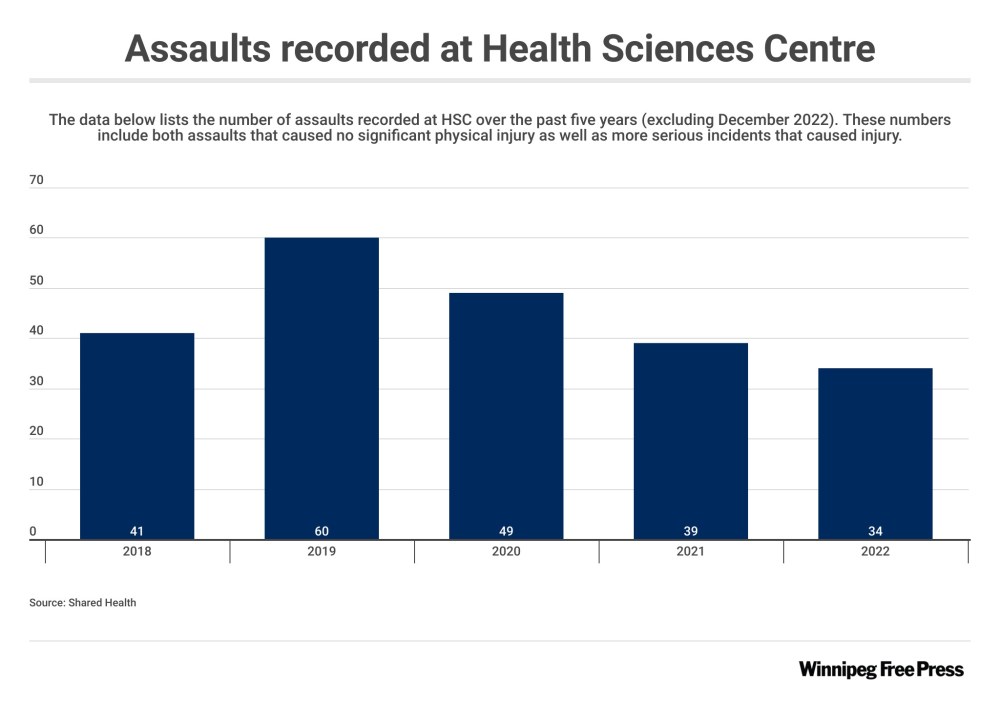‘If there’s violence, no one’s safe’: nurses seek provincial action on workplace safety
Advertisement
Read this article for free:
or
Already have an account? Log in here »
To continue reading, please subscribe:
Monthly Digital Subscription
$0 for the first 4 weeks*
- Enjoy unlimited reading on winnipegfreepress.com
- Read the E-Edition, our digital replica newspaper
- Access News Break, our award-winning app
- Play interactive puzzles
*No charge for 4 weeks then price increases to the regular rate of $19.00 plus GST every four weeks. Offer available to new and qualified returning subscribers only. Cancel any time.
Monthly Digital Subscription
$4.75/week*
- Enjoy unlimited reading on winnipegfreepress.com
- Read the E-Edition, our digital replica newspaper
- Access News Break, our award-winning app
- Play interactive puzzles
*Billed as $19 plus GST every four weeks. Cancel any time.
To continue reading, please subscribe:
Add Free Press access to your Brandon Sun subscription for only an additional
$1 for the first 4 weeks*
*Your next subscription payment will increase by $1.00 and you will be charged $16.99 plus GST for four weeks. After four weeks, your payment will increase to $23.99 plus GST every four weeks.
Read unlimited articles for free today:
or
Already have an account? Log in here »
Hey there, time traveller!
This article was published 12/04/2023 (975 days ago), so information in it may no longer be current.
Four years after praising the Progressive Conservative government for introducing legislation to create institutional safety officers, there still are no such officers — and the situation is less safe than ever, nurses say.
“Violence in health care is escalating daily,” Manitoba Nurses Union president Darlene Jackson said Wednesday. “This government really needs to step up, move in and get those ISOs trained and in place.
“Managing the violence is not just for the staff but for the patients, the families there. If there’s violence, no one’s safe.”

JOHN WOODS / WINNIPEG FREE PRESS FILES
“Violence in health care is escalating daily,” Manitoba Nurses Union president Darlene Jackson said Wednesday.
In question period Wednesday, the Opposition asked Justice Minister Kelvin Goertzen why the Tory government hasn’t made sure hospitals are staffed with the special safety officers the legislation enabled.
“ISOs were supposed to increase safety and security at health-care facilities and reduce demands on police services,” said NDP justice critic Matt Wiebe. “Why has he failed to establish a single ISO at our health-care facilities?”
Goertzen said his government created the legislation, training programs were developed, and graduating officers are being employed by the University of Manitoba.
He could not say why no officers have been employed at a Manitoba hospital.
A Shared Health spokesman said Wednesday work to introduce institutional safety officers is ongoing. One security staff member received training last month from a third party that will help inform how ISOs are going to be trained to work in a hospital setting, he said.
No timeline was provided.
Meantime, nurses are sounding the alarm the safety officers — who are trained and equipped to intervene in volatile situations — are needed now.
For those who work at Winnipeg’s downtown Health Sciences Centre, the peril starts in the parkade, Jackson said.
“(Staff) are often in the stairwell, where individuals are using drugs and injecting drugs. There’s been many break-ins. One source said there was a car started on fire.”
While staff can call security for an escort to and from their parked vehicles, the wait can be up to 40 minutes because of demands on security, Jackson said.
“It’s a concern when you have to walk through danger to get to your job, which also includes violence and danger.”
Shared Health said parking areas are routinely monitored and patrolled. It acknowledged during common shift changes there can be a backlog of people waiting for a safety escort.
Efforts to make the workplace safer — such as setting up “amnesty lockers” for HSC patients and visitors to secure any weapons they may be carrying — haven’t seemed to help, Jackson said.
“I talked to a nurse this morning at the ER who said they made very little difference… They’re still finding people with weapons on them coming into in the ER.”
Shared Health said new security measures are always reviewed.

It provided data for HSC showing the number of reported assaults on staff have fallen in recent years.
In 2018, 41 assaults were reported. The next year, it was 60.
In 2020 — with new staff safety protocols and COVID-19 pandemic visitor restrictions — the number of reported assaults dropped to 49. It dipped further in 2021, down to 39.
For the first 11 months of 2022, there were 34 assaults reported.
However, Jackson said, it’s not just staff at HSC, emergency room nurses and Winnipeg hospital nurses who are assaulted.
“We’re hearing from nurses who work in mental health units, where violence and abuse toward staff is absolutely on the rise. I’ve talked to home care nurses going into buildings where police won’t go without a second officer,” the MNU president said.
“It doesn’t matter where you are, there is an escalation of abuse.”
The union now has to rely more on anecdotal evidence, because it’s no longer being informed about all assaults, Jackson said.
Shared Health quietly changed the reporting process so a nurse who has filled out an assault report at work must now also sign a consent form in order for the employer to pass along their report to the nurses union, she said.
The union is challenging that decision.
Shared Health said Wednesday the process for reporting incidents was recently “modified and streamlined,” and sites are “managing this process and continue to work with local union representatives regarding these occurrences.”
carol.sanders@freepress.mb.ca

Carol Sanders
Legislature reporter
Carol Sanders is a reporter at the Free Press legislature bureau. The former general assignment reporter and copy editor joined the paper in 1997. Read more about Carol.
Every piece of reporting Carol produces is reviewed by an editing team before it is posted online or published in print — part of the Free Press‘s tradition, since 1872, of producing reliable independent journalism. Read more about Free Press’s history and mandate, and learn how our newsroom operates.
Our newsroom depends on a growing audience of readers to power our journalism. If you are not a paid reader, please consider becoming a subscriber.
Our newsroom depends on its audience of readers to power our journalism. Thank you for your support.
History
Updated on Wednesday, April 12, 2023 7:47 PM CDT: Updates graphics








